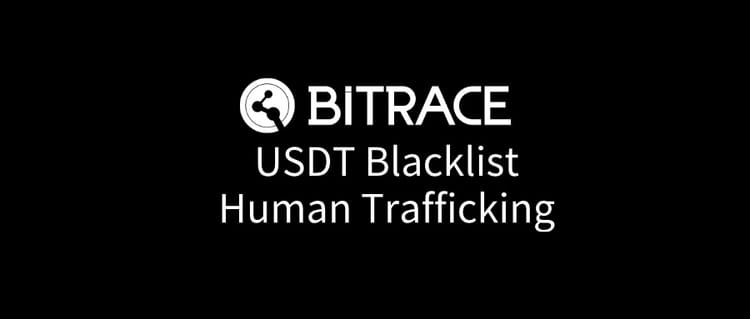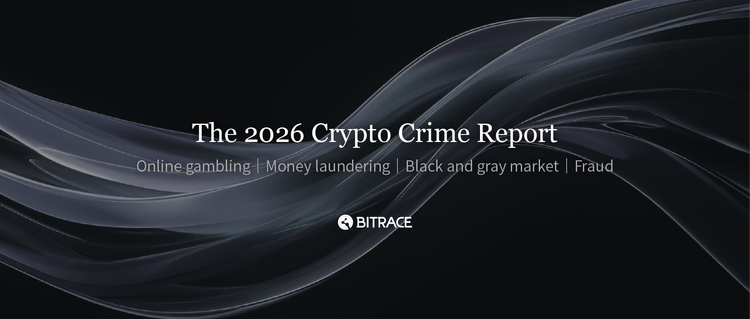Southeast Asia's Telecom Fraud Slave Labor Trafficking Industry: Cryptocurrency-Backed Forced Transport(kidnapping) Guarantee Platforms

Cryptocurrency transaction guarantee platforms primarily serve as matchmaking and intermediary services for Southeast Asia’s black and gray markets. Their clientele includes entities involved in money laundering, illicit payments, Illegal inquiry of citizens' information, smuggling, gambling, and other illegal activities. These platforms have now become powerful tools for cybercrime syndicates.
Beyond these conventional types of crime, some transaction guarantee platforms also engage in human trafficking under the guise of ‘overseas labor services.’ This article aims to expose the development trends of this anti-human criminal industry and, through cryptocurrency analysis, investigate its operational scale and financial contamination.
The trafficking of telecom fraud laborers in Southeast Asia
Southeast Asian telecom fraud syndicates recruit employees based on the nationality of their target victims. For example, in scams targeting Chinese communities—such as the ‘Pig Butchering Scam’—large numbers of young Chinese individuals cross borders each year, through legal or illegal means, to work in fraud compounds.
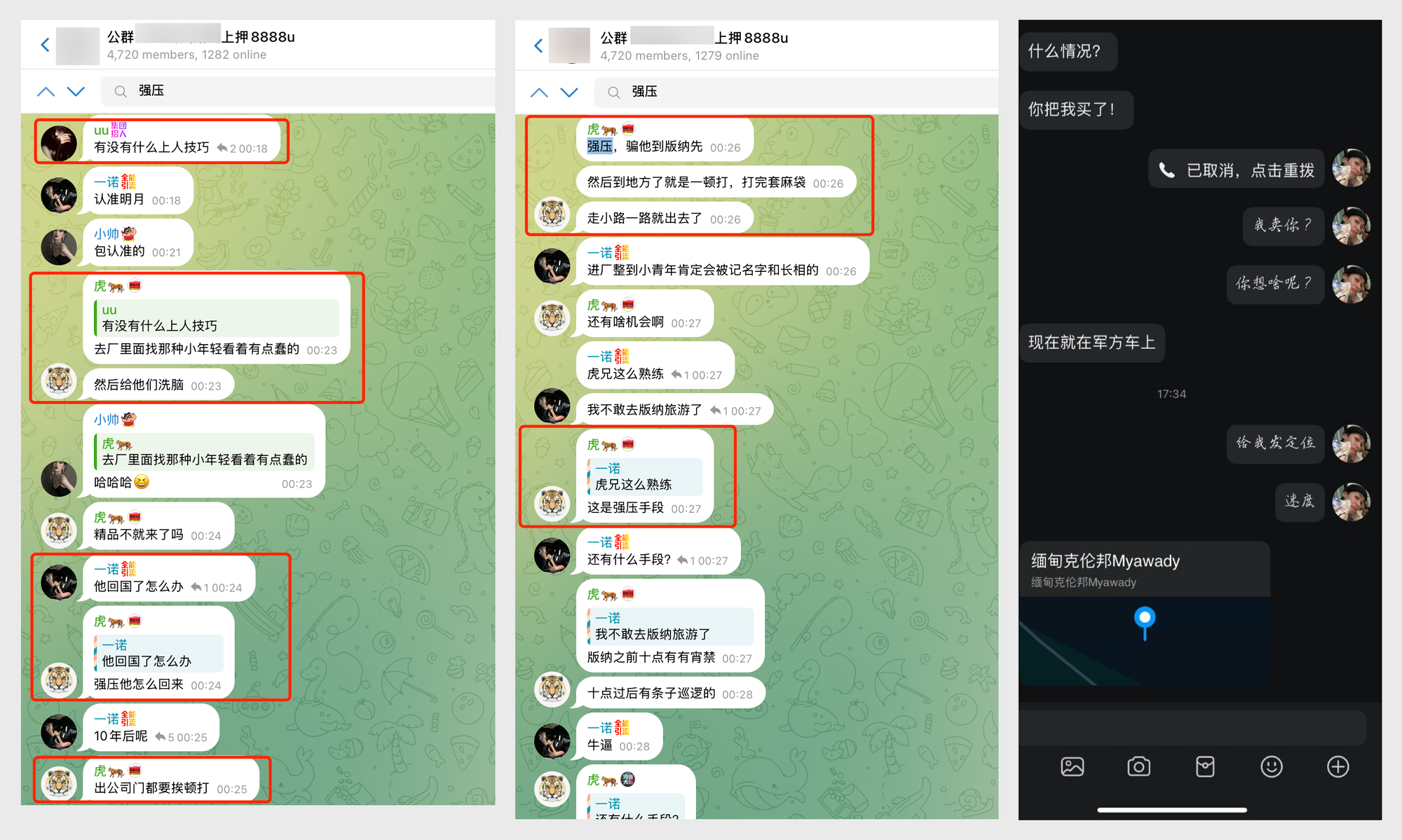
These young individuals are often deceived or coerced into entering Southeast Asia, and by the time they realize they’ve been sold into forced labor within telecom fraud compounds, it’s usually too late to escape.
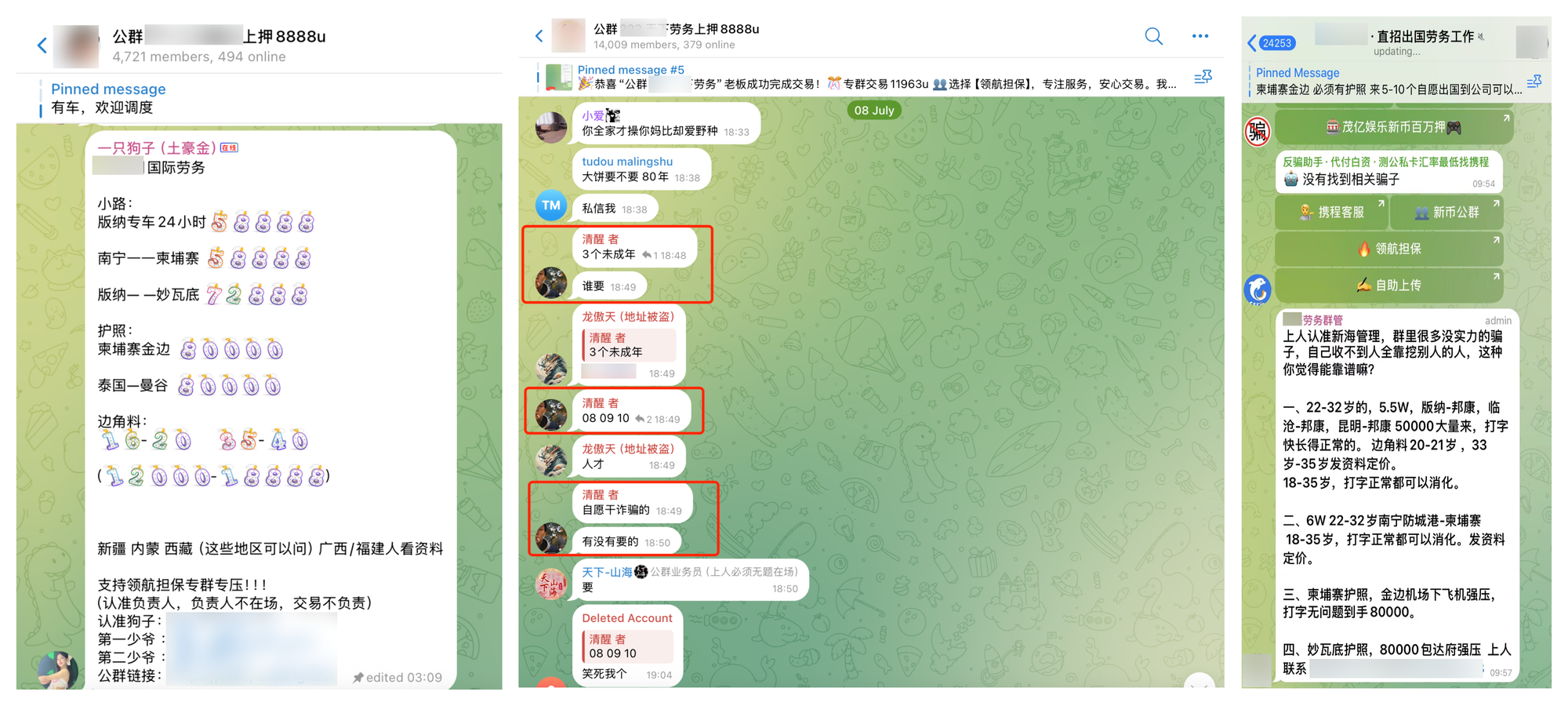
Typically, young men aged 20 to 30 are the most sought-after ‘commodities’ and can be sold at higher prices. Those under 20 or over 35 are considered ‘scraps’—either priced lower or subjected to stricter evaluations. Women are almost entirely excluded from these transactions.

The kidnapping case of actor Wang Xing, which had previously caused a huge public outcry in Chinese mainland, involved Wang Xing himself being sold to a fraud park through this channel.
Forced Escort Transport (kidnapping) Transaction Guarantee Services
In conventional black and gray market material transactions, the business logic of transaction guarantee platforms resembles that of e-commerce platforms like Amazon or Taobao. Merchants must first pay a deposit to the platform before conducting business, and the total transaction amount at any given time cannot exceed the deposit limit. If a merchant fails to deliver valid services or goods due to their own fault, buyers have the right to request platform arbitration and may even receive compensation from the deposit. Through this model, transaction guarantee platforms establish trust between parties engaged in illegal transactions.
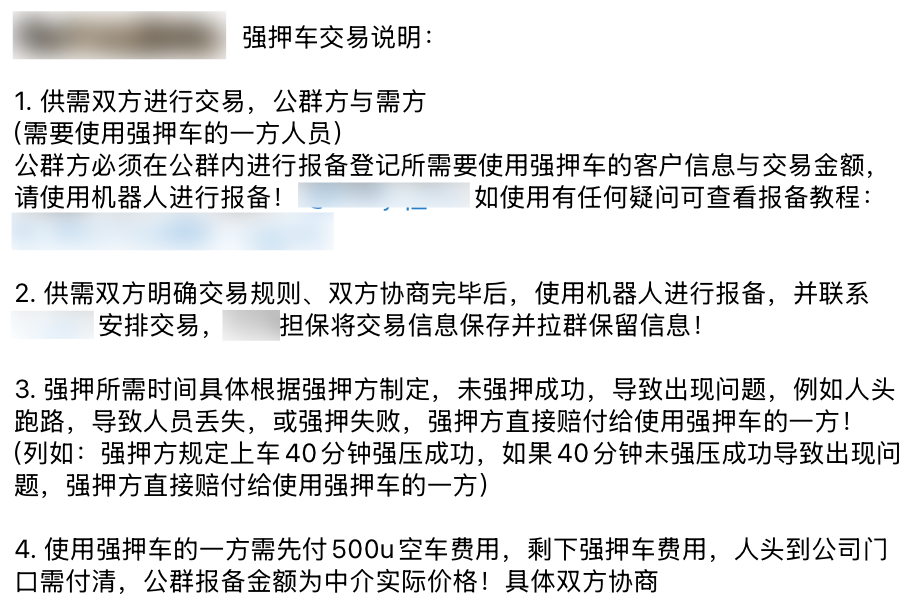
In human trafficking operations, the basic model remains the same: when humans are the subject of the transaction, such merchants are referred to as ‘labor-type transaction guarantee vendors.’ However, since unwilling victims may attempt to Jump out of the car (literally), report to authorities, or refuse to cooperate, some vendors resort to intimidation, coercion, and physical abuse during transport. Those who offer such additional services are known as ‘Forced Escort Transport (kidnapping) Transaction.’ The term ‘forced escort’ is industry slang here, referring to kidnapping.
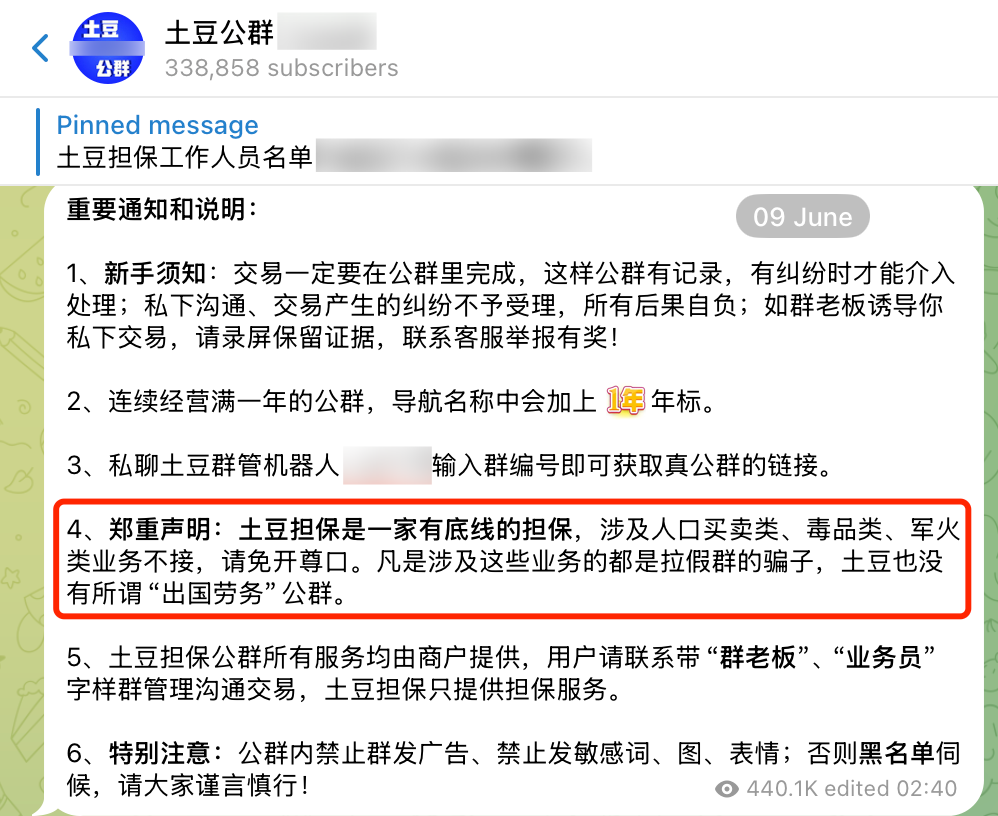
Due to global law enforcement crackdowns on transnational human trafficking crimes, the vast majority of transaction guarantee platforms refuse to provide services for human trafficking-related illegal transactions. Even Tudou Guarantee, the flagship platform under Cambodia’s Huione Group, emphasizes a ‘human bottom line’ and claims non-involvement—highlighting just how egregious this type of business has become.
Address Analysis of Linghang Guarantee’s Private Group Deposit System
Linghang Guarantee is the only one among Southeast Asia’s top ten transaction guarantee platforms that operates both public and private groups for ‘overseas labor’ services, and explicitly states that it provides guarantee services for forced escort transactions.
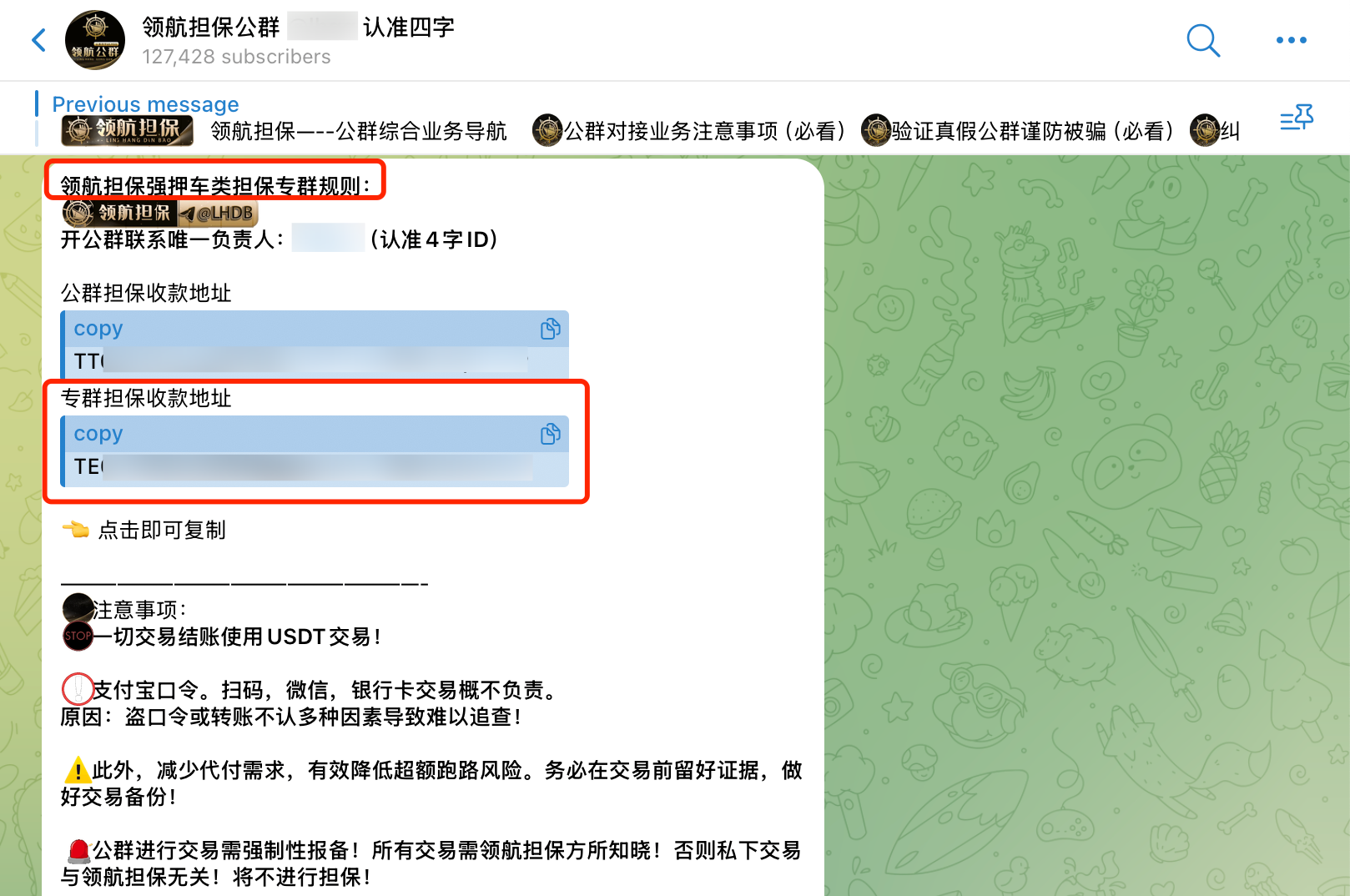
The pinned announcement on Linghang Guarantee’s official Telegram channel states that vendors offering ‘forced escort’ services must submit deposits via designated private group addresses. This indicates that counterparties interacting with these publicized addresses are affiliated with entities involved in transnational human trafficking across Southeast Asia. Thanks to this, investigators from Bitrace were able to conduct blockchain analysis.
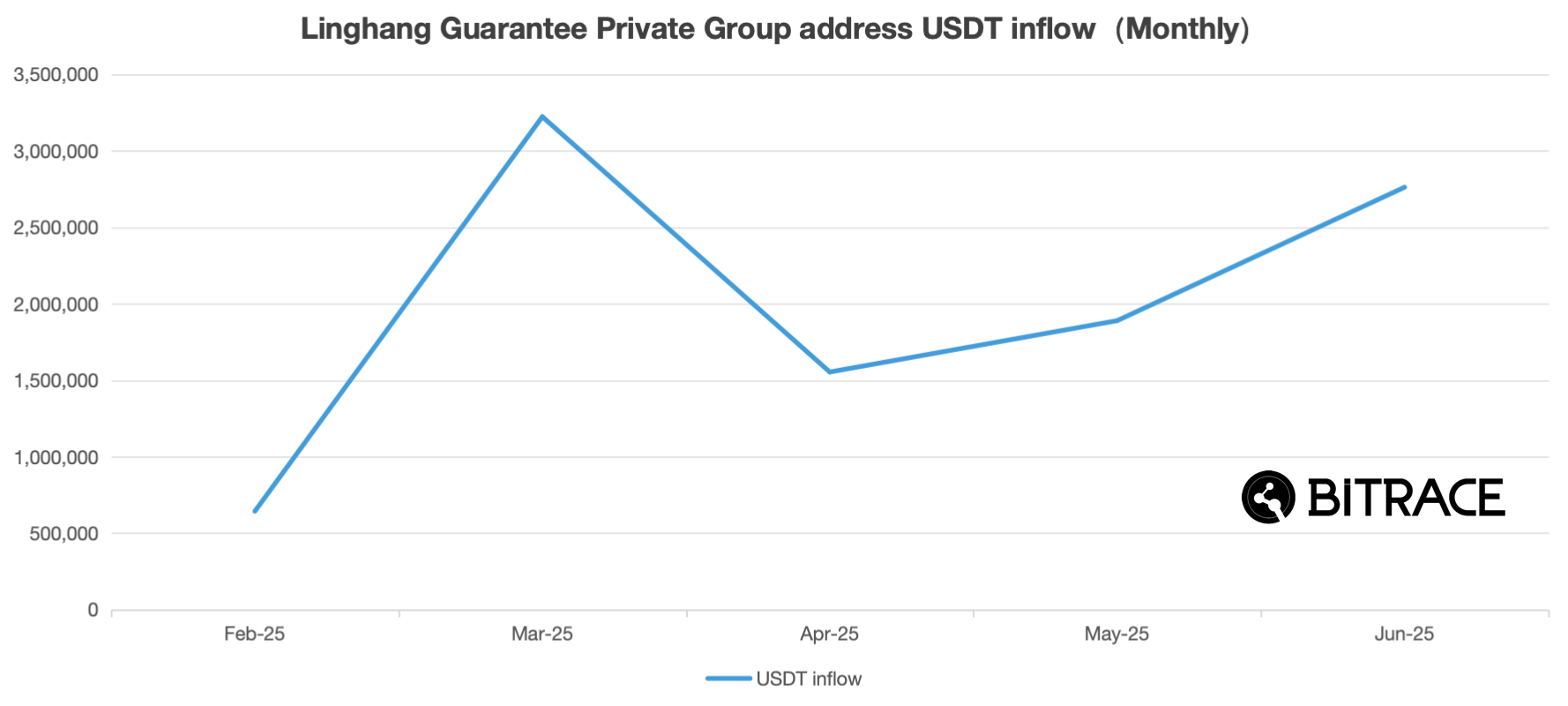
Linghang Guarantee’s latest private group deposit address was activated on February 23, 2025. In less than five months, it received a total of 10,074,805.56 USDT—worth over 10 million U.S. dollars.
It’s important to note that this sum only represents deposits submitted by vendors exclusively engaged in ‘forced escort guarantee’ services. Within the deposit limit, vendors can repeatedly conduct business, meaning the actual volume of funds tied to transnational human trafficking in Southeast Asia far exceeds this figure.
Analysis of Fund Contamination in Slave Labor Trafficking
By analyzing counterparties to Linghang Guarantee’s private group deposit address, Bitrace investigators attempted to assess how centralized exchanges are being exploited.
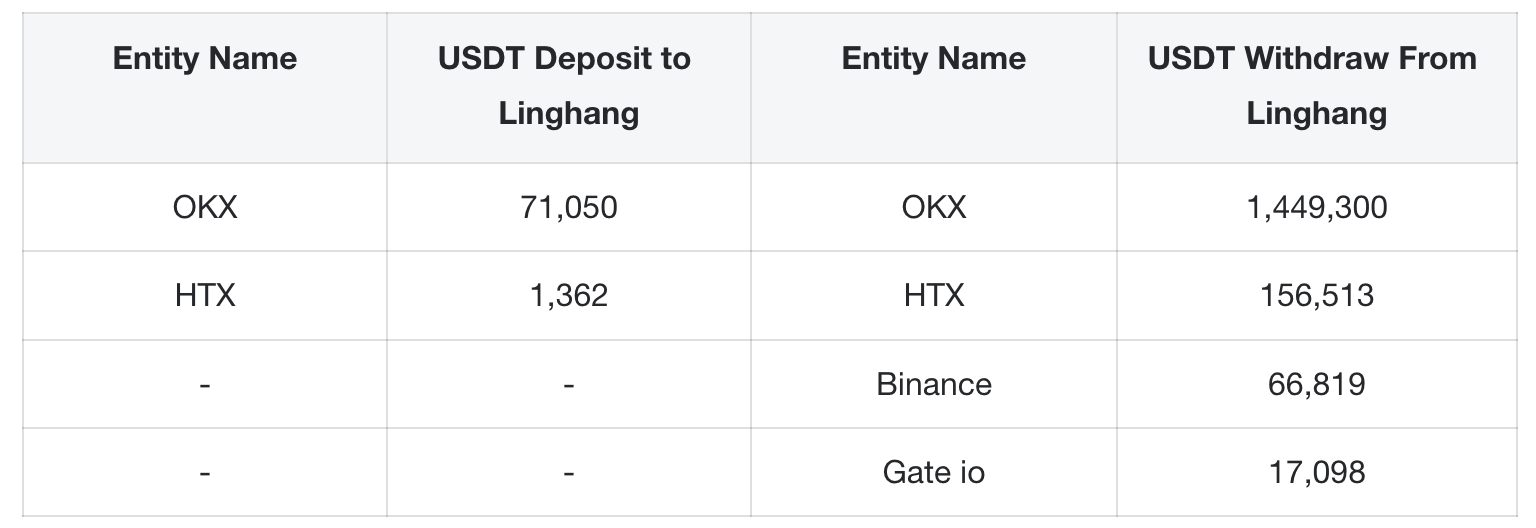
On the funding source side, two exchanges transferred a total of 18 transactions amounting to 72,418 USDT to the audited address. These transactions indicate that Linghang Guarantee vendors directly used exchange addresses to submit deposits, which were used to underwrite their human trafficking operations.
On the withdrawal side, 262 user addresses from four exchanges received 414 transactions totaling 1,689,730 USDT from the audited address. These transactions suggest that after ceasing operations, Linghang Guarantee vendors transferred refunded deposits directly back into exchange accounts.

All four exchanges are of Chinese background and primarily serve Chinese-speaking users, which aligns with the business model of Linghang Guarantee’s private group vendors—who mainly traffic Chinese individuals to Southeast Asian telecom fraud compounds. Among them, OKX, as one of the world’s leading centralized cryptocurrency exchanges, has been heavily exploited for deposit payments and criminal fund storage. Notably, 17.3% of withdrawal activity from Linghang Guarantee’s private group deposit address was traced to 236 OKX user addresses.
Threats Posed by Guarantee Funds
Illegal transaction guarantee platforms often operate in conjunction with anonymous social apps and on-chain money laundering schemes, posing a persistent and covert financial threat to crypto institutions.
Take Telegram, the most commonly used social app in this space: while many public group vendors openly share their business details and wallet addresses, the truly dangerous transactions are often hidden within private or VIP groups, making them difficult to detect.
Frequent changes in business addresses further complicate ongoing monitoring. While top-tier platforms may rotate addresses in a relatively stable manner, smaller platforms tend to mix multiple addresses without clear rules, overlap business functions, and lack consistency—posing serious challenges for risk control teams.
As a result, it’s not just illegal crypto transaction guarantee platforms that pose a threat. Funds tied to organized crimes such as online gambling, money laundering, and fraud also infiltrate centralized entities like exchanges, creating widespread financial contamination.
Words in the End
Combating transnational human trafficking operations in Southeast Asia requires not only coordinated law enforcement efforts across countries and regions, but also proactive cooperation from operators of crypto infrastructure—including CEX, OTC, and crypto payment platforms.”
Bitrace has maintained close collaboration with law enforcement and regulatory agencies across Asia, actively participating in the investigation and analysis of over a thousand virtual asset-related cases. Through this process, Bitrace has accumulated extensive field experience and high-value risk intelligence.
Leveraging this foundation, Bitrace has built a high-quality risk address database covering more than 20 mainstream and emerging blockchains. Combined with proprietary AI models and large language model technologies, Bitrace continuously enhances its capabilities in risk tagging, fund flow analysis, and address clustering—enabling rapid detection and intelligent analysis of complex on-chain money laundering and criminal activities.
With tools such as Bitrace Pro, Bitrace Blacklist, and Bitrace AML, Bitrace effectively meets the diverse compliance needs of financial institutions, delivering a robust experience for operators and risk control teams.
Contact us:
Website: www.bitrace.io
Email: bd@bitrace.io
Twitter: @Bitrace_team
LinkedIn:@bitrace tech
